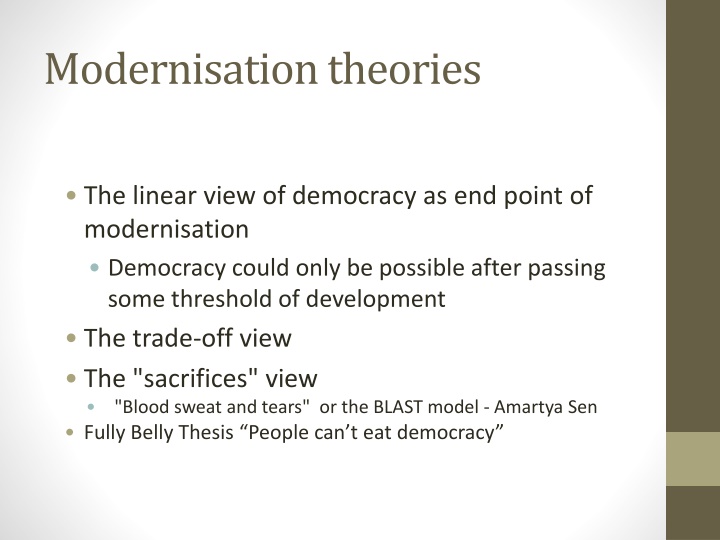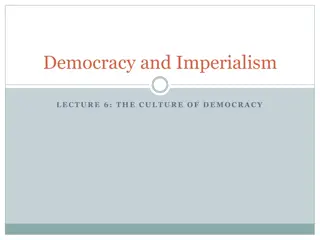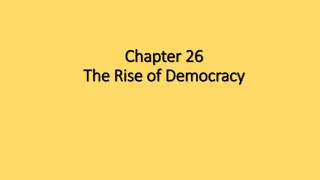Perspectives on Modernization, Development, and Democracy
Various perspectives on the relationship between modernization, development, and democracy are explored, including the linear view of democracy as a modernization endpoint, the trade-off between development and democracy, and the case for democracy despite authoritarian advantages. The debate between authoritarian developmentalism and democratic states is analyzed, highlighting examples such as Botswana and Mauritius as successful democratic developmental states. The role of strong states in development is discussed within the context of authoritarian versus infrastructural power, emphasizing the self-corrective capacity of democracies.
Download Presentation

Please find below an Image/Link to download the presentation.
The content on the website is provided AS IS for your information and personal use only. It may not be sold, licensed, or shared on other websites without obtaining consent from the author.If you encounter any issues during the download, it is possible that the publisher has removed the file from their server.
You are allowed to download the files provided on this website for personal or commercial use, subject to the condition that they are used lawfully. All files are the property of their respective owners.
The content on the website is provided AS IS for your information and personal use only. It may not be sold, licensed, or shared on other websites without obtaining consent from the author.
E N D
Presentation Transcript
Modernisation theories The linear view of democracy as end point of modernisation Democracy could only be possible after passing some threshold of development The trade-off view The "sacrifices" view "Blood sweat and tears" or the BLAST model - Amartya Sen Fully Belly Thesis People can t eat democracy Thandika Mkandawire, LSE London
Development versus Democracy Authoritarian advantage Efficiency Political Stability national unity argument Long-time perspective due to freedom from populist and myopic demands Higher revenue collection capacity Historical evidence of Developmental authoritarian regimes the India China comparison The East Asian Miracle economies The Soviet Exoerience 9/21/2024
Domestic Politics The nation-building quest for unity Conflation of unity with uniformity Overthrow of nationalist movements by military rulers Authoritarian developmentalism: Silent: Development in Progress Thandika Mkandawire, LSE London
The Authoritarian advantage once again Interpretation of the role of developmental state as inherently authoritarian The Pinochet and Chicago Boys link-up and the view that only authoritarian regimes could implement SAP Thandika Mkandawire, LSE London The developmental state literature was used to suggest that East Asia was following the correct path - development then democracy. Africans were seen as sequencing the process wrongly Initial suspicion that democracy would undermine adjustment
Case for democracy New Empirical evidence refutes the law-like trade-off between on democracy and growth But Suggests that democracies at low level of income risk reversal While democracies may not perform spectacularly they do not fail as egregiously as authoritarian regimes There have been democratic developmental States Two of the frequently cited are Africa Botswana and Mauritius Development requires strong states but strong states are not necessarily authoritarian states Authoritarian versus infrastrucultural power Self-corrective capacity of democracies 9/21/2024
Inherited weakened states The aftermath of adjustment and retrenchment Democratisation has focussed on formal issues of holding elections and paid less attention to substantive issues of well being Reduced extractive capacity and problems of meeting of social needs of newly empowered groups
SAP and Democracy Trade-off argument Democracies prone to Rent-seeking and policy capture Populist pressures for consumption Coordination problems Instability of policy Political business cycles
The new embrace of democracy End of Cold War and neoliberal triumphalism Fukuyama: End of History and Mrs. Thatcher s insistence There is no alternative Thandika Mkandawire, LSE London Adoption by New democracies of orthodoxy policies facilitated conditionalities New understanding of Development as Freedom a view expressed in 1960s by Arthur Lewis Evidence of no trade-offs between democracy and growth
Ideological stance of new democracies Many were orthodox in reaction to the interventionism of their authoritarian predecessors Some equated free markets with democracy Although oppositions to orthodox policies played a major role, the political leadership that emerged were middle class in favour of markets Some of these were former bureaucrats or politicians turned businessmen and women
How are African democracies doing? They are generally doing better than their authoritarian predecessor But are they doing better than their contemporaries?
Many democracies are moving away from orthodox policies Over time democratic politics works against formulaic orthodox and tend to move context specific policies Some of the new democracies are benefitting from the recent resource boom which renders the traction of conditionalities less effective The shift from the more formalistic aspects of democracy towards substantive issues of social justice Thandika Mkandawire, LSE London
The accumulation challenge In a capitalist economy high growth calls for high profitability The challenge is to ensure that profits accruing to capitalists are productively and not consumes of repatriated No clear developmental pacts have emerged
Democracy and Growth Through the analysis of the latest economic and political data, which include up to 43 countries in sub-Saharan Africa for the period of 1982-2012, they find strong evidence that democracy is positively associated with economic growth And that this democratic advantage is more pronounced for those African countries that haveremained democratic for longer periods of time .
New challenges Over time democratic politics works against formulaic orthodox and tend to move context specific policies Some of the new democracies are benefitting from the recent resource boom which renders the traction of conditionalities less effective The shift from the more formalistic aspects of democracy towards substantive issues of social justice Thandika Mkandawire, LSE London
Democracy is superior to autocracy only when structural factors, such as external threats or natural resource intensity, are not favorable to growth. Conversely, where structural factors are conducive to growth, autocracies are likely to perform better or equally well as democracies.























